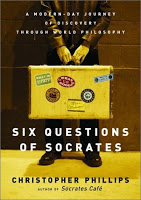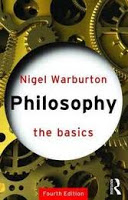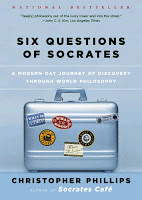
An introduction to philosophy? “Why?” I hear you asking. How philosophical of you!
As near as I can tell there are two breeds of philosopher. There is the walking quote-book, brimming with facts and dates and names. If you describe a thought, they can name the theory. The other philosopher lives to think the next thought, typically ignoring its source and merit. If you describe a thought, they’re unusually excited.
 You must be asking why I am defining philosophers. My, you are so inquisitive!
You must be asking why I am defining philosophers. My, you are so inquisitive!
If you prefer factoids to fantasies, you could perhaps start with Philosophy for Beginners, by Richard Osborne. With the use of comic book format, this book covers everything from the ancient Greeks to the Enlightenment, discussing the major voices of each period. The book continues with key philosophical theories and their advocates, including a chapter on North American thought.
 If you need an introduction to philosophy in general, grab The Basics: philosophy by Nigel Warburton. A history and many theories are rewritten in simpler language, and classified under eight sweeping categories: An Introduction to Philosophical Thought, followed by God, Right and Wrong, Politics, The External World, Science, Mind, and Art. Once in the chapter of choice, applicable theories are briefly described, and accredited to their notorious thinkers.
If you need an introduction to philosophy in general, grab The Basics: philosophy by Nigel Warburton. A history and many theories are rewritten in simpler language, and classified under eight sweeping categories: An Introduction to Philosophical Thought, followed by God, Right and Wrong, Politics, The External World, Science, Mind, and Art. Once in the chapter of choice, applicable theories are briefly described, and accredited to their notorious thinkers.
Now we cross out of studies of thought and into the practice of thinking.
Try 50 Philosophy Ideas You Really Need to Know, by Ben Dupre. With a running timeline at the bottom of the page (which marks a theory’s place in history), nine categories frame the 50 queries detailed in this book. Plato’s Cave analogy, the Turing Test, the Ship of Theseus, and the Golden Rule are just some of the mind-blowing theories presented.
 Perhaps you find philosophy painful to read. Check out, from Thomas Cathcart and Daniel Klein, Plato and a Platypus Walk into a Bar: understanding philosophy through jokes. Philosophy often breaks with practical thought, to the point that a theory might be ridiculous. Hilariously ridiculous, if you read this book! Illuminating jokes are paired with brief explanations, to make an easy read from such a dense topic. And curiously, it is the comedy that really helps define topics as like logic, perception, and free will.
Perhaps you find philosophy painful to read. Check out, from Thomas Cathcart and Daniel Klein, Plato and a Platypus Walk into a Bar: understanding philosophy through jokes. Philosophy often breaks with practical thought, to the point that a theory might be ridiculous. Hilariously ridiculous, if you read this book! Illuminating jokes are paired with brief explanations, to make an easy read from such a dense topic. And curiously, it is the comedy that really helps define topics as like logic, perception, and free will.
Would you rather a book that helps you think, rather than make you think? Take at look at The Pig that Wants to Be Eaten: and 99 other thought experiments by Julian Baggni. Each question is phrased in a short narrative, followed by references, a discussion on why the question is complex, and suggestions for similar thoughts within the book. The chapters are short, good for perusing, while the notions are difficult, good for musing.
This is a book made to start (or stop) conversations.
 And for a title that walks you through thoughts, thinking, and thinking about thoughts, grab something by Christopher Phillips, such as Six Questions of Socrates: a modern-day journey of discovery through world philosophy. Phillips is a modern philosopher with a love of Socrates and his method of inquiry. Dubbed ‘Socrates Cafes’, he hosts gatherings of average people, presents them with a deep topic, and lets them talk. He uses the Socratic Method, which is asking questions that verify, clarify, or nullify. The point isn’t to reach a conclusion, but to talk and think with one’s community. He speaks with people from all walks of life; reservation Natives, Greek academics, a classroom full of Japanese children, American maximum security prisoners, and Roman Catholics. Anyone curious about philosophy.
And for a title that walks you through thoughts, thinking, and thinking about thoughts, grab something by Christopher Phillips, such as Six Questions of Socrates: a modern-day journey of discovery through world philosophy. Phillips is a modern philosopher with a love of Socrates and his method of inquiry. Dubbed ‘Socrates Cafes’, he hosts gatherings of average people, presents them with a deep topic, and lets them talk. He uses the Socratic Method, which is asking questions that verify, clarify, or nullify. The point isn’t to reach a conclusion, but to talk and think with one’s community. He speaks with people from all walks of life; reservation Natives, Greek academics, a classroom full of Japanese children, American maximum security prisoners, and Roman Catholics. Anyone curious about philosophy.
And if that includes you, why not start a Socrates Cafe of your own?



